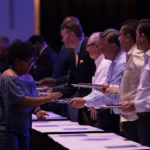Turn-about apparently is fair play. Even in missions.
For decades after World War II, Southern Baptists—with plenty of Texans at the vanguard—planted churches all over the United States. To be candid, the impetus sprang from a combination of jobs-based migration, missionary zeal and plain ol’ homesickness.
 Editor Marv KnoxBaptists raised from Texas to Georgia and up to Virginia found themselves working elsewhere, from the Northeast, to the Upper Midwest and out on the West Coast. They were Baptists, by golly, and they wanted to worship in a Baptist church. And while Baptist congregations already existed in many of their communities, those were different kinds of Baptist churches. So, the immigrants started their own. The Southern Baptist Convention mushroomed, planting churches in all 50 states. Eventually, the migration and homesick influences wore off, and thousands of those “Southern” Baptist churches reflect the indigenous character of their regions.
Editor Marv KnoxBaptists raised from Texas to Georgia and up to Virginia found themselves working elsewhere, from the Northeast, to the Upper Midwest and out on the West Coast. They were Baptists, by golly, and they wanted to worship in a Baptist church. And while Baptist congregations already existed in many of their communities, those were different kinds of Baptist churches. So, the immigrants started their own. The Southern Baptist Convention mushroomed, planting churches in all 50 states. Eventually, the migration and homesick influences wore off, and thousands of those “Southern” Baptist churches reflect the indigenous character of their regions.
Because of this legacy, Baptists in Texas and the Southwest have tended to see their region as a mission base and themselves as missionary senders.
Here comes the Baptist General Conference
So, the cover of the winter 2015 edition of Converge Point, the magazine of Converge Worldwide—also known as the Baptist General Conference—might come as a shock. There it is in bold type: “Vision Texas: New faces, new church planting momentum.” The headline over the lead story is even more direct: “Starting churches in the Nation of Texas.”
Most folks affiliated with the Baptist General Convention of Texas probably never heard of the Baptist General Conference. They’re not from around here.
They got their start in the mid-19th century among Swedes who emigrated to the United States and primarily settled in the Upper Midwest. Early on, they identified ethnically and called their union the Swedish Baptist General Conference. By the mid-20th century, Swedish immigration slowed to a trickle, and English became the primary language in their churches. They also launched non-Swedish churches. So, they changed their name to the Baptist General Conference.
By the end of the last century, “the Baptist General Conference name began to lose its cultural currency,” according to their website. And although they clung to historic Baptist distinctives, they “didn’t want to spend precious time refuting stereotypes of other Baptist leaders or groups.” So they changed their name to Converge Worldwide, although they retained the name Baptist General Conference “in some settings and for legal purposes.”
Sign up for our weekly edition and get all our headlines in your inbox on Thursdays
Focusing on Texas
But now, this former Swedish Baptist group, based near Chicago, is focusing on planting churches in Texas, particularly in North Texas and down the Interstate 35 corridor.
God has been “bringing passionate church planters together in a region experiencing an explosive job market and burgeoning house construction,” Converge Point Editor Bob Putman notes in the magazine’s cover story.
He talks about new churches and planned congregations in some of our state’s fastest-growing communities—McKinney, Prosper and Rhome, as well as Denton and San Antonio.
“What’s attractive for pastors and church planters is we want to be part of a movement that God’s behind,” explains Pastor Randy Moore of Revolution Church in McKinney. “God is behind Vision Texas,” the church-planting emphasis.
“Texas represents an Alaska-size opportunity for Converge church planting, Putman adds. “Led by God, (Converge church planters) have banded together to reach the Lone Star State.”
If the Converge Movement’s Texas-sized audacity has raised the hackles on the back of your neck, take a deep breath and pat those hackles down.
Allies in reaching Texas
God bless our formerly Swedish Baptist Converge sisters and brothers. They’ve been our allies in the Baptist World Alliance and the Baptist Joint Committee for Religious Liberty for decades. And they’re our allies in reaching Texas with the gospel.
Texas is too big and too lost to worry about who participates in saving souls and discipling people in the nurture and admonition of the Lord. Our state is growing faster than we are reaching it. So, if an Illinois-based Baptist movement pulls alongside our BGCT boat to fish for women and men, then the least we can do is extend the right hand of Christian fellowship, pray for them and bless them.
(OK, the irony is too great: The same thing applies to the Southern Baptists of Texas Convention, which split from the BGCT in 1998. Yes, some of their leaders still misrepresent our convention. But the vast majority of their churches and pastors are sweet-spirited folks who want to share the gospel with people who desperately need it. God bless them, too.)
The church-planting endeavors of other Baptist Christians—even right here in Texas—ought to inspire us to greater effort and generosity. Texas Baptists have developed a wonderful church-planting program, and many of our churches plant other churches. But we can do more. We must do more.
After all, the “Nation of Texas” needs the gospel like never before.














We seek to connect God’s story and God’s people around the world. To learn more about God’s story, click here.
Send comments and feedback to Eric Black, our editor. For comments to be published, please specify “letter to the editor.” Maximum length for publication is 300 words.